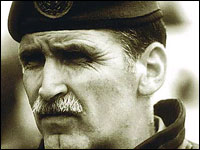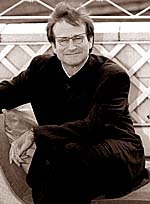
I’ll do my best to recapture what was for me a moving experience. Roméo Dallaire, now Canadian senator and retired Canadian Military General – Commander of the UN peace keeping mission in Rwanda, came to speak at Kate Andrews High School. He spoke for about 30 minutes and then opened the floor for questions for the next half hour. It was stunning. As we were sitting there waiting in the gymnasium, I kept telling kids that this was going to change their lives. Many of the students I talked to later said it was the best assembly they had attended. I’ll try to capture some of the many high points for posterity. (Probably many of you regular readers are tired already of my copious writing)
Dallaire began by giving us a frame work of what he said had changed from a Canadian role to a responsibility to the world and more specifically, as it was to high school students that he was addressing, to adolescents around the world in developing countries.
Dallaire said that education was a core issue. He had attended a Summit of the Americas youth conference in Montreal where he was honored to receive the recommendations of the over 400 youth in attendance. The number one recommendation was to place priority on broad based education. He commented that sectarian efforts were mildly effective but he clearly said – there is too much evangelist education and not enough broad based (likely meaning ‘secular’) education.
He then outlined how Canadian values marked us as an extraordinary leader on the world stage.
Human rights, hard work ethic, dignity of life, and fairness were the four values that he said marked Canadians as distinct from other nations. As an example he told a story from Rwanda.
A 30 person platoon had come upon a village where everyone had been slaughtered. Mowed down in their homes. The platoon worked their way through the village searching for survivors. At the end of the town they encountered a large culvert. In it were numerous bodies, mutilated, raped – but some were still alive.
Dallaire said he queried the 26 different nations who had a military presence with the UN forces and asked them what they would expect their lieutenant to order their troops to do in that situation, knowing that at least half of the people in that village were infected with HIV/AIDS. Any assistance would expose their troops to being infected as soldiers were not outfitted with all the protective equipment for situations like those. Dallaire said 23 of the 26 nations said they would order their troops to leave the situation citing the risk of infection as being too great and the fact that like these people would die anyway. Canada was one of the three other nations.
So, Dallaire said, the platoon in the situation happened to be Canadian. And the lieutenant in charged was faced with this dilemma. But the officer was never able to give an order of any kind because before he could give any direction the platoon had jumped into the ditch and were pulling out bodies.
That story sent shivers down my spine…
I remember the stories about the war my family escaped so many years ago. And I was gripped with a great sadness. Sadness I remember living with for many years after we left Nicaragua.
Dallaire went on to take questions from the audience who had been told to watch a documentary on the Rwandan situation before attending the assembly. To my delight the students by in large asked intelligent questions. On the rare occasion that a student asked Dallaire about whether he was still friends with the hotel owner in the movie Hotel Rwanda. Dallaire suffered the child by acknowledging craftily working the answer into a poignant commentary about how we are to view all media with a jaundiced eye.
In one question he was asked about
former president Clinton’s ‘apology’ speech to Rwandans recently “I don’t like Bill Clinton!” Dallaire said. After the auditorium applause died down, he said the presidents policy of only acting in countries where there was some sort of ‘self interest’ meant that even though information about the genocide was being relayed to Washington it never reached the president due to the policy he himself had put in place. Therefore, when in 1998 he claimed that he did not know how bad it really was; Dallaire said that was Clinton’s own fault. Then Dallaire said, “and this fall when we are together at (unnamed) conference I am going to tell him that – though I suspect he already knows how I feel.”
Dallaire also commented on how the situation in the
Darfur had received little to no media attention. He said how ironic it was that the tsunami had over shadowed a catastrophe of far greater magnitude. And that in the one year anniversary of the tsunami how much reporting had taken place on retrospectives of the natural disaster which was largely uncontrollable. Ironically, almost no reporting was done on the unnatural disaster that took place during the same time period in Darfur – far more preventable it would seem.
The presentation was moving. I have yet to feel as patriotic as when that man spoke of our identity as Canadians. I have rarely felt more Christian than when I realized that those values were precisely the ones
Jesus was talking about in Matthew 25.
I was admonished as well. One student said, “Mr. Dallaire it would seem you and your soldiers went through hell out in Rwanda – would you do it again?”
“Instantaneously!” he said and paused. “I would do it again not because I want to go to hell again but because it is my responsibility to help – and if I could have saved one more person or changed one more thing to bring about success I would do it.”
“You have to remember,” he said, “my mission in Rwanda was a failure. We were supposed to prevent the genocide from happening.” That statement spoke deeply. Here is a man we respect because in the face of failure and utter despair chose to do as best he knew how in the situation. Then I look at Jesus and see that by all accounts people would have written off his ‘mission’ as a failure – yet he persevered through it all. Then I look at how success oriented my own ‘mission’ in life is and I am ashamed.
Dallaire was also asked if he had lost faith in the international community. “My son,” he said, “optimism is spark of life. Cynicism is much easier but far more destructive. There are many problems with the international community but it is all we have.”
I tend to be a cynic. This was a good admonition for me. I probably could have inserted church for international community. It is important to remember that unchecked cynicism is destructive…
One more thing…
In a post assemble conversation with a friend of mine. We talked about the speech. We reflected on how many of the same themes came out in Dallaire’s speech as were in
Bono’s presidential breakfast address. The comment was made that it was amazing how rock stars and former generals were sounding more like Jesus did than many of our evangelical preacher often do. What a cynical thing to say…
Or is it?
Senator Romeo Dallaire speaks to Mennonite students
Senator Romeo Dallaire spoke recently to high school students at Mennonite Brethren Collegiate Institute (MBCI) in Winnipeg. Dallaire was the Force Commander of the UN mission to Rwanda during the 1994 genocide there; he recounted his harrowing experience in the prize-winning book Shake Hands with the Devil. MBCI teacher Paul Doerksen commented, "What struck me immediately was Dallaire's open declaration of the Christian framework from within which he understands things and seeks to live his life." When pressed about the role of the Christian faith in his own life, and in complex scenarios such as the Rwandan genocide, Dallaire stated that he firmly believes in the existence of the devil, whose hand he shook in the form of leaders of the Hutu extremists. "I know the devil exists, and therefore I know there is a God," he told students. -- Mennonite Brethren Herald

















